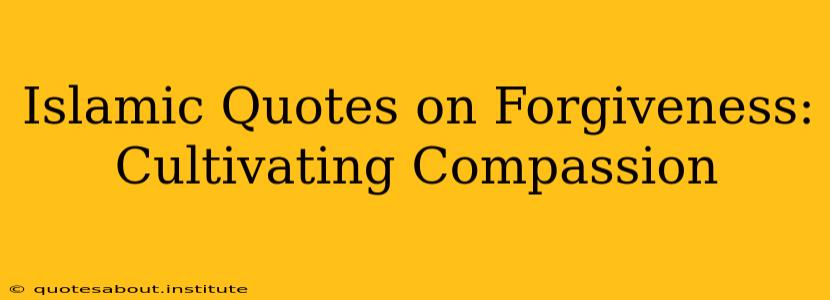Forgiveness, a cornerstone of Islam, is far more than simply letting go of anger. It's a profound spiritual practice that cultivates compassion, strengthens relationships, and ultimately leads to inner peace. The Quran and the Sunnah (teachings and practices of Prophet Muhammad) are replete with verses and hadiths emphasizing the importance of forgiveness, highlighting its immense rewards in this life and the hereafter. This exploration delves into insightful Islamic quotes on forgiveness, examining their meaning and practical application in our daily lives.
What are the benefits of forgiveness in Islam?
Forgiveness, in Islam, isn't a sign of weakness but a testament to inner strength and spiritual maturity. It's a conscious choice to release resentment and negativity, freeing oneself from the burden of anger and hatred. The benefits are numerous, extending far beyond personal well-being:
- Inner Peace: Holding onto anger and resentment weighs heavily on the soul. Forgiveness allows for emotional release and inner tranquility.
- Stronger Relationships: Forgiveness mends broken bonds and fosters stronger, healthier relationships based on trust and understanding.
- Divine Reward: Islam emphasizes the immense reward for those who forgive others, promising blessings in this world and the next.
- Improved Mental and Physical Health: Studies show that forgiveness is linked to better mental and physical health, reducing stress and promoting well-being.
- Following the Prophet's Example: Prophet Muhammad (peace be upon him) was known for his extraordinary capacity for forgiveness, setting a powerful example for Muslims to emulate.
What does the Quran say about forgiveness?
The Quran frequently extols the virtue of forgiveness, emphasizing its importance in achieving spiritual growth and closeness to Allah. Many verses encourage believers to forgive those who have wronged them, highlighting the divine reward associated with this act:
-
"And whoever forgives and makes reconciliation – his reward is [due] from Allah. Indeed, Allah does not like wrongdoers." (Quran 42:40) This verse underscores the divine reward associated with forgiveness and reconciliation, contrasting it with the divine displeasure towards those who persist in wrongdoing.
-
"The recompense of an evil deed is an evil deed like it, but whoever forgives and makes reconciliation, his reward is [due] from Allah. Indeed, He does not like wrongdoers." (Quran 42:40) This repetition emphasizes the importance of the concept.
-
Numerous other verses advocate for patience and forgiveness in the face of adversity, highlighting their spiritual benefits and aligning them with the character of Allah.
What are some hadiths about forgiveness?
The Sunnah of Prophet Muhammad (peace be upon him) provides countless examples and teachings on the importance of forgiveness. His actions and words serve as a practical guide for Muslims seeking to cultivate this essential virtue:
-
A hadith narrates Prophet Muhammad (peace be upon him) saying, "Forgive, and you will be forgiven." This succinct statement captures the essence of forgiveness as a reciprocal act, reflecting the divine attribute of mercy.
-
Another hadith emphasizes the importance of forgiving others even if they repeatedly wrong you. This highlights the continuous nature of forgiveness and its connection to inner strength and spiritual resilience.
-
Numerous hadiths describe instances where the Prophet (peace be upon him) demonstrated extraordinary forgiveness, even towards his harshest critics, showcasing forgiveness as a powerful tool for conflict resolution and social harmony.
How can I practice forgiveness in my daily life?
Practicing forgiveness is an ongoing process, requiring conscious effort and self-reflection. Here are some practical steps to cultivate forgiveness in your daily life:
-
Understand the Root of Anger: Identify the underlying emotions fueling your anger. Recognizing the source can help you process your feelings more effectively.
-
Practice Empathy: Try to see the situation from the other person's perspective. Understanding their motivations and circumstances can lead to greater compassion.
-
Pray for Forgiveness: Seek Allah's help and guidance in letting go of resentment and anger through prayer.
-
Engage in Self-Reflection: Examine your own actions and acknowledge any role you may have played in the conflict.
-
Set Boundaries: Forgiveness doesn't necessarily mean condoning harmful behavior. It's important to set healthy boundaries to protect yourself while still extending forgiveness.
Is it difficult to forgive someone who has deeply hurt me?
Forgiving someone who has caused you deep pain can be incredibly challenging. It's crucial to remember that forgiveness is a process, not a single event. It may take time, and it's okay to feel anger, sadness, and other emotions along the way. Seek support from family, friends, or a religious leader if needed. Remember that forgiveness is ultimately for your own well-being, freeing you from the burden of resentment and allowing you to move forward with your life.
What if the person who hurt me refuses to apologize?
Forgiveness doesn't require an apology from the other person. It's a personal choice you make for your own well-being, releasing yourself from the grip of negativity. While an apology can be healing, it's not a prerequisite for forgiveness. Your act of forgiveness is primarily for your own spiritual growth and inner peace.
By understanding and applying the principles of forgiveness found in the Quran and Sunnah, Muslims can cultivate compassion, strengthen relationships, and achieve lasting inner peace. The journey of forgiveness is a continuous process, requiring patience, self-reflection, and a sincere commitment to following the teachings of Islam.

